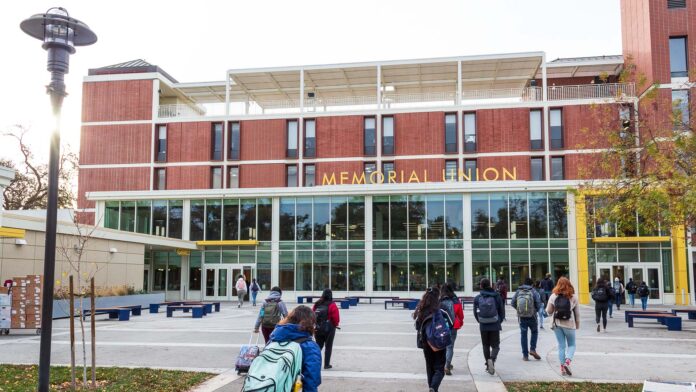Future ASUCD Winter Elections moved to Spring Quarter
The results of the 2020 ASUCD Winter Elections celebrated sweeping victory for the extensively campaigned Basic Needs and Services Referendum. But Senate Bill 31 was not on the ballot alone — the Constitutional Cleanup Amendment, CA 67, was listed beneath SB 31.
The reforms addressed in the Constitutional Cleanup Amendment, however, are significant. The amendment intends to: “Further define the position of External Affairs Vice President (EAVP), shifting the timing of ASUCD Elections, institutionalization of binding 10-year plans, clarification of processes for Special Elections, and transitioning successors through an online file storage system.”
EAVP reform
According to ASUCD President Justin Hurst, the description for the EAVP role was not previously outlined in the constitution.
Hurst said the EAVP “is a position that is analogous with other campuses.” The UC Student Association is composed of all UC campus’ EAVPs, and Hurst noted now the association is “along with all the other UC’s.” Hurst clarified that EAVP is not a new position, rather, its definition was simply missing in the Constitution until now.
Elections reform
In response to shifting ASUCD elections from Winter Quarter to Spring Quarter, Hurst explained that the change will not be implemented this Spring Quarter, but rather starting in Spring Quarter 2021. Therefore, newly elected officials will serve for an extra quarter, with the exception of the EAVP, whose election will remain in the fall.
Newly elected Student Advocate Ashley Lo commented on moving the elections. times.
“All the other UC’s, in their associated student bodies, […] have elections in Spring Quarter,” Lo said. “We’re the only one who does it during Winter Quarter.”
Both Hurst and Lo noted that when Hurst was sworn in, he attended UC-wide meetings as a brand new president, while other members in attendance were at the end of their terms.
“The presidents of all the UC Associated Students meet up regularly, and oftentimes it can be difficult when we have different people terming in at different times,” Lo said. “It can create a disconnect in communication when there are people with different experiences because they are at different parts of their terms.”
Institutional memory reform
Moving elections to Spring Quarter coincides with another item listed with the amendment reforms: creating an online transitioning member file storage system.
“ASUCD has a historical problem with transition and institutional memory,” Hurst explained. “This was an effort to have online resources so people aren’t starting from scratch.”
Hurst and Lo commented on their own difficult experiences transitioning into their roles, and how they hope the revised constitution will prevent miscommunication in the future.
Hurst noted that he only had one transitional meeting with his predecessor. His first month as ASUCD president was confusing and exhausting, considering ASUCD’s budget deficit and incompatible term schedule with the rest of the UC campuses.
Lo encountered similar difficulties in her transition into her role as Internal Affairs Commissioner when, as a freshman, the chair of her commission suddenly resigned.
“There was someone on my commission who was a junior, so he took over his chair, [but] then, about four weeks into his term, he let us know he could no longer continue because he was leaving to study abroad,” Lo said. “It was certainly a very sudden transition. Since he was leaving to study abroad, he couldn’t be too much of a resource. I would have appreciated more resources and knowledge about the role — what it entails — along with some of just the small details.”
Lo referred to the online file transition system as “Guidelines for institutional memory sake; a resource to know what the role has been, what it is now, and how I can improve it.”
Institutionalization of 10-year plan, special election reform
The last two items on the amendment background included “clarifying the processes for special elections,” and “institutionalization of binding 10-year plans.” Hurst noted that these two items go hand in hand with each other as we see the effects of the amendment play out.
“[The 10-year-plan] was very much a plan B for if the fee referendum didn’t pass, having a more experienced executive team working on the budget,” Hurst explained. “In the 10-year-plan, we included a lot of transition and institutional memory. In particular, one of the things we implemented was a shared Google drive between ASUCD.”
Given that CA 67 passed, Hurst predicts that there will be a special election regarding constitutional measures and the 10-year-plan in the spring.
“Even though special elections were heavily explicit in the constitution with the wording, it was not explicitly defined as something ASUCD could do,” Hurst said. “By making it explicit and putting it in the constitution, there’s no legality question about whether a special election is to be called by the Senate.”
The constitutional amendment simply unifies ASUCD’s term calendar and governmental practices with the entire UC Associated Students to ensure effective communication and successful transitioning. In addition, it recognizes ASUCD’s functions in official wording.
Hurst explains, “[CA 67] brings our current practices into line with the Constitution.”
Written by: Hannah Blome — features@theaggie.org









